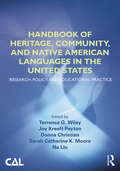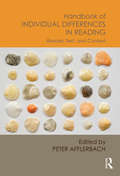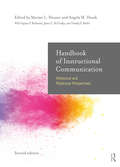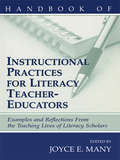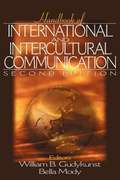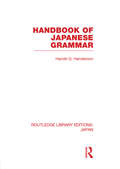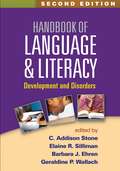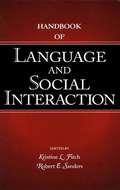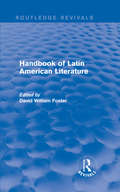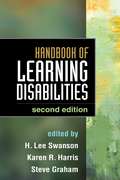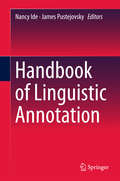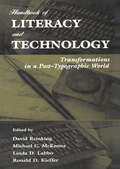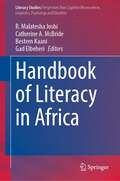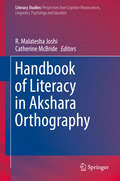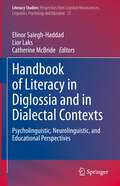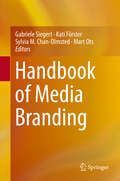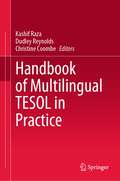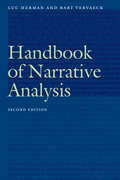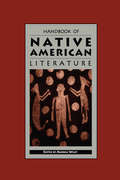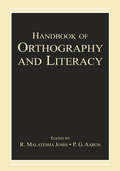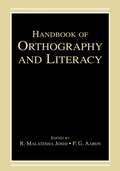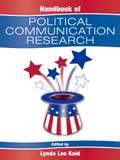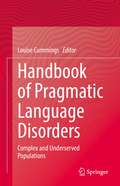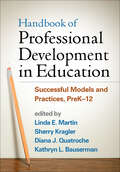- Table View
- List View
Handbook of Heritage, Community, and Native American Languages in the United States: Research, Policy, and Educational Practice
by Sarah Catherine K. Moore Donna Christian Joy Kreeft Peyton Terrence G. Wiley Na LiuCo-published by the Center for Applied Linguistics Timely and comprehensive, this state-of-the-art overview of major issues related to heritage, community, and Native American languages in the United States, based on the work of noted authorities, draws from a variety of perspectives—the speakers; use of the languages in the home, community, and wider society; patterns of acquisition, retention, loss, and revitalization of the languages; and specific education efforts devoted to developing stronger connections with and proficiency in them. Contributions on language use, programs and instruction, and policy focus on issues that are applicable to many heritage language contexts. Offering a foundational perspective for serious students of heritage, community, and Native American languages as they are learned in the classroom, transmitted across generations in families, and used in communities, the volume provides background on the history and current status of many languages in the linguistic mosaic of U.S. society and stresses the importance of drawing on these languages as societal, community, and individual resources, while also noting their strategic importance within the context of globalization.
Handbook of Individual Differences in Reading: Reader, Text, and Context
by Peter AfflerbachThe central unifying theme of this state-of-the-art contribution to research on literacy is its rethinking and reconceptualization of individual differences in reading. Previous research, focused on cognitive components of reading, signaled the need for ongoing work to identify relevant individual differences in reading, to determine the relationship(s) of individual differences to reading development, and to account for interactions among individual differences. Addressing developments in each of these areas, this volume also describes affective individual differences, and the environments in which individual differences in reading may emerge, operate, interact, and change. The scant comprehensive accounting of individual differences in reading is reflected in the nature of reading instruction programs today, the outcomes that are expected from successful teaching and learning, and the manner in which reading development is assessed. An important contribution of this volume is to provide prima facie evidence of the benefits of broad conceptualization of the ways in which readers differ. The Handbook of Individual Differences in Reading moves the field forward by encompassing cognitive, non-cognitive, contextual, and methodological concerns. Its breadth of coverage serves as both a useful summary of the current state of knowledge and a guide for future work in this area.
Handbook of Instructional Communication: Rhetorical and Relational Perspectives
by Angela Hosek Marian L. HouserThe Handbook of Instructional Communication offers a comprehensive collection of theory and research focusing on the role and effects of communication in instructional environments. Now in its Second Edition, the handbook covers an up-to-date array of topics that includes social identity, technology, and civility and dissent. This volume demonstrates how to understand, plan, and conduct instructional communication research as well as consult with scholars across the communication discipline. Designed to address the challenges facing educators in traditional and nontraditional settings, this edition features a wealth of in-text resources, including directions for future research, suggested readings, and surveys for instructional assessment.
Handbook of Instructional Practices for Literacy Teacher-educators: Examples and Reflections From the Teaching Lives of Literacy Scholars
by Joyce E. ManyThis volume offers a unique glimpse into the teaching approaches and thinking of a wide range of well-known literacy researchers, and the lessons they have learned from their own teaching lives. The contributors teach in a variety of universities, programs, and settings. Each shares an approach he or she has used in a course, and introduces the syllabus for this course through personal reflections that give the reader a sense of the theories, prior experiences, and influential authors that have shaped their own thoughts and approaches. In addition to describing the nature of their students and the program in which the course is taught, many authors also share key issues with which they have grappled over the years while teaching their course; others discuss considerations that were relevant during the preparation of this particular syllabus or describe how it evolved in light of student input. The book is organized by areas within literacy education: reading; English/language arts; literature; emergent literacy; content-area literacy; literacy assessment and instruction; literacy and technology; and inquiries into literacy, theory, and classroom practice. It is accompanied by an interactive Web site: http://msit.gsu.edu/handbook. This online resource provides additional information about the authors' courses including complete syllabi, recommended readings, grading rubrics, and sample assignments. Readers are invited to respond and contribute their own syllabi and teaching experiences to the discourse generated by the volume.
Handbook of International and Intercultural Communication
by William B. Gudykunst Bella ModyGudykunst (speech communication, Asian American studies, Cal. State U., Fullerton) and Mody (telecommunications, Michigan State U.) present this reference for scholars, new researchers and graduate students in international or intercultural communication. Twenty-nine chapters were contributed by 42 accomplished scholars. Where the first edition focused primarily on intercultural communication, this new edition gives equal coverage to four areas: cross-cultural, intercultural, international, and developmental communication. Annotation c. Book News, Inc., Portland, OR (booknews.com)
Handbook of Japanese Grammar (Routledge Library Editions: Japan)
by Harold G HendersonThis grammar has been written to help the student to think in the Japanese way. Part One contains several introductory notes on Nomenclature, Syntax, Verbs, Aru, Iru, Oru, on Adjectives and on Foreign Words. Part Two concentrates on connectives – the particles and suffixes which modify the sense of other words or show the relationship of these words to each other. These connectives, the heart of Japanese grammar, present unusual difficulty to foreign students. Arranged alphabetically in dictionary form, each word is followed by a textual explanation of how it is used and of its various meanings, with cautions as to its translation. The forms covered include not only those of the "standard" colloquial literary or bungo styles, but also the more common colloquialisms and provincial forms, whether or not these are strictly grammatical. No other text available makes as through or as complete a classification.
Handbook of Language and Literacy, Second Edition
by Elaine R. Silliman C. Addison Stone Barbara J. Ehren Geraldine P. WallachAn acclaimed reference that fills a significant gap in the literature, this volume examines the linkages between spoken and written language development, both typical and atypical. Leading authorities address the impact of specific language-related processes on K-12 literacy learning, with attention to cognitive, neurobiological, sociocultural, and instructional issues. Approaches to achieving optimal learning outcomes with diverse students are reviewed. The volume presents research-based practices for assessing student needs and providing effective instruction in all aspects of literacy: word recognition, reading comprehension, writing, and spelling. New to This Edition *Chapters on digital literacy, disciplinary literacy, and integrative research designs. *Chapters on bilingualism, response to intervention, and English language learners. *Incorporates nearly a decade's worth of empirical and theoretical advances. *Numerous prior edition chapters have been completely rewritten.
Handbook of Language and Social Interaction (Routledge Communication Series)
by Kristine L. Fitch Robert E. SandersThis Handbook stands as the premier scholarly resource for Language and Social Interaction (LSI) subject matter and research, giving visibility and definition to this area of study and establishing a benchmark for the current state of scholarship. The Handbook identifies the five main subdisciplinary areas that make up LSI--language pragmatics, conversation analysis, language and social psychology, discourse analysis, and the ethnography of communication. One section of the volume is devoted to each area, providing a forum for a variety of authoritative voices to provide their respective views on the central concerns, research programs, and main findings of each area, and to articulate the present or emergent issues and directions. A sixth section addresses LSI in the context of broadcast media and the Internet. This volume's distinguished authors and original content contribute significantly to the advancement of LSI scholarship, circumscribing and clarifying the interrelationships among the questions, findings, and methods across LSI's subdisciplinary areas. Readers will come away richer in their understanding of the variety and depth of ways the intricacies of language and social interaction are revealed. As an essential scholarly resource, this Handbook is required reading for scholars, researchers, and graduate students in language and social interaction, and it is destined to have a broad influence on future LSI study and research.
Handbook of Latin American Literature (Routledge Revivals)
by David William FosterFirst published in 1987 (this second edition in 1992), the Handbook of Latin American Literature offers readers the opportunity to explore this literary history in the English Language and constitutes an ideological approach to Latin American Literature. It provides both concise information concerning particular authors, works, and literary traditions of Latin America as well as comprehensive material about the various national literatures of the area. This book will therefore be of interest to Hispanic scholars, as well as more general readers and non-Hispanists.
Handbook of Learning Disabilities, Second Edition
by Steve Graham Karen R. Harris H. Lee SwansonWidely regarded as the standard reference in the field, this comprehensive handbook presents state-of-the-art knowledge about the nature and classification of learning disabilities (LD), their causes, and how individuals with these difficulties can be identified and helped to succeed. Best practices are described for supporting student performance in language arts, math, and other content areas. Contributors also identify general principles of effective instruction and review issues in service delivery within response-to-intervention (RTI) frameworks. The book critically examines the concepts and methods that guide LD research and highlights important directions for future investigation. New to This Edition: *Incorporates key advances in identifying and remediating LD, with particular attention to the role of RTI. *Chapters on social cognitive, behavioral genetic, and neurobiological aspects. *Chapters on adolescents and adults with LD. *Chapters on spelling instruction, history instruction, and classroom technology applications. *Chapter synthesizing 21st-century advances in LD research methods, plus chapters on advanced statistical models, single-case designs, and meta-analysis.
Handbook of Linguistic Annotation
by James Pustejovsky Nancy IdeThis handbook offers a thorough treatment of the science of linguistic annotation. Leaders in the field guide the reader through the process of modeling, creating an annotation language, building a corpus and evaluating it for correctness. Essential reading for both computer scientists and linguistic researchers. Linguistic annotation is an increasingly important activity in the field of computational linguistics because of its critical role in the development of language models for natural language processing applications. Part one of this book covers all phases of the linguistic annotation process, from annotation scheme design and choice of representation format through both the manual and automatic annotation process, evaluation, and iterative improvement of annotation accuracy. The second part of the book includes case studies of annotation projects across the spectrum of linguistic annotation types, including morpho-syntactic tagging, syntactic analyses, a range of semantic analyses (semantic roles, named entities, sentiment and opinion), time and event and spatial analyses, and discourse level analyses including discourse structure, co-reference, etc. Each case study addresses the various phases and processes discussed in the chapters of part one.
Handbook of Literacy and Technology: Transformations in A Post-typographic World
by Michael C. McKenna Linda D. Labbo Ronald D. Kieffer David ReinkingThe major shift going on today in the technologies of reading and writing raises important questions about conventional conceptions of literacy and its role in education, society, and culture. What are the important characteristics of electronic forms of reading and writing distinguishing them from printed forms? To what extent and in what ways is literacy being transformed by new technologies? This central question is addressed in this volume from diverse, multidisciplinary perspectives. The contributing authors focus on a guiding question in one of the following areas, which correspond to the major sections of the book: *Transforming Texts. What are the new differences between printed and electronic texts, and what are the implications of new textual forms for defining literacy, especially in regard to teaching and learning in schools? *Transforming Readers and Writers. How do electronic reading and writing change conceptualizations of literacy development from childhood through adulthood? *Transforming Classrooms and Schools. What are the effects of introducing new reading and writing technologies into schools and classrooms? *Transforming Instruction. How can instruction be adapted in response to the changing literacy landscape, and how can teachers and students exploit forms of reading and writing to enhance teaching and learning? *Transforming Society. What are the broad societal implications of the increasing prevalence of electronic forms of reading and writing? *Transforming Literacy Research. What are the questions that must be addressed as digital reading and writing become more common, and what approaches to research will be most useful in addressing those questions? This volume is the result of an interactive process. The contributors met as a group to discuss drafts of their chapters at a one-day meeting convened and sponsored by the National Reading Research Center, and had read each others' chapters prior to this gathering. That meeting was followed by a two-day conference attended by approximately 180 researchers, educators, and policymakers who responded to an open invitation to present papers and to attend sessions focusing on the six major themes of the book. Contributors then revised their chapters based on interactions with fellow contributors, conference participants, and volume editors. Thus, this work is more than just a compilation of the individual authors' views. Rather, it represents a synthesis of a broad range of current thinking about how literacy is being and may be transformed by technology.
Handbook of Literacy in Africa (Literacy Studies #24)
by R. Malatesha Joshi Gad Elbeheri Catherine A. McBride Bestern KaaniThis volume highlights the shortcomings concerning literacy development in Africa and collates the current available literature based on empirical research in various countries in a coherent manner. Further emphasized is how the current research can guide practical information to improve the literacy situation in Africa. The research studies will encompass various fields such as linguistics, neurosciences, and education and will provide future research directions and instructional recommendations to improve the literacy situation in Africa.
Handbook of Literacy in Akshara Orthography (Literacy Studies #17)
by R. Malatesha Joshi Catherine McBrideThis volume examines the unique characteristics of akshara orthography and how they may affect literacy development and problems along with the implications for assessment and instruction. Even though akshara orthography is used by more than a billion people, there is an urgent need for a systematic attempt to bring the features, research findings, and future directions of akshara together in a coherent volume. We hope that this volume will bridge that gap. Akshara is used in several Indic languages, each calling it by a slightly different name, for example 'aksharamu', in Telugu, 'akshara' in Kannada, and 'akshar' in Hindi. It is the Bhrami-derived orthography used across much of the Indian subcontinent. There is a growing body of research on the psycholinguistic underpinnings of learning to read akshara, and the emerging perspective is that akshara, even though classified as alphasyllabaries, abugida, and semi-syllabic writing systems, is neither alphabetic nor syllabic. Rather, akshara orthography is unique and deserves to be a separate classification and needs further investigation relating to literacy acquisition in akshara. The chapters in this volume, written by leading authors in the field, will inform the reader of the current research on akshara in a coherent and systematic way.
Handbook of Literacy in Diglossia and in Dialectal Contexts: Psycholinguistic, Neurolinguistic, and Educational Perspectives (Literacy Studies #22)
by Elinor Saiegh-Haddad Catherine McBride Lior LaksThis volume is the first published collection of papers on the impact of diglossia and dialectal variations on language and literacy acquisition, impairment, and education. The authors are pioneering in this field and are leading researchers with substantial experience in conducting research in this area. A wide range of areas and languages are covered, including the US, South Africa, Israel, and various European countries. The chapters present novel data and insights regarding the role of dialectal variations on language and literacy, from a wide range of countries and perspectives. These insights have significant theoretical and practical implications.A majority of literacy learners worldwide are taught to read and write in a language variety or a dialect that is not the same as their spoken language. Not only is this the global norm, but it is probably also the greatest obstacle to literacy learning. This volume is the first published collection of papers on the role of dialect in language and literacy acquisition, impairment, and education in a variety of languages and situations across Europe, the Middle East, North America, Africa, and Asia.The authors are pioneers in this field.
Handbook of Media Branding
by Gabriele Siegert Kati Förster Sylvia M. Chan-Olmsted Mart OtsThis comprehensive handbook critically addresses current issues and achievements in the field of media branding. By discussing media branding from different viewpoints, disciplines and research traditions, this book offers fresh perspectives and identifies areas of interest for further research. The authors highlight the peculiarities of this field and reveal links and commonalities with other areas of study within communication science. The chapters address different research areas, such as society-, content-, management-, audience- as well as advertising aspects of media brands. This handbook thus brings together contributions from different areas making it a valuable resource for researchers and experts from industry interested in media branding.
Handbook of Multilingual TESOL in Practice
by Christine Coombe Kashif Raza Dudley ReynoldsThis book presents exemplars of multilingualism in TESOL worldwide. It incorporates essential topics such as curriculum development, classroom instruction, materials creation, assessment, and teacher training where TESOL and multilingualism co-exist and co-develop. The wide-ranging and international collection of chapters is written by leading researchers in multilingualism and TESOL from around the world. This handbook provides unique insights into a range of practical approaches to promote local, indigenous and national languages in English language classrooms across a range of instructional programs in various geographical contexts. The book is divided into six sections. Part 1 presents curricular and principle-based approaches to multilingual TESOL in ESL/EFL classes. Part 2 includes chapters that showcase how diverse teachers bring multilingual TESOL to their classrooms. Part 3 discusses the challenges of teaching multilingual TESOL and how educators address them in their contexts. Part 4 provides activities and materials to support local languages in TESOL classrooms. Part 5 addresses assessment issues in multilingual TESOL. Part 6 includes initiatives and examples to prepare TESOL teachers to promote multilingualism in ESL/EFL classrooms.
Handbook of Narrative Analysis (Frontiers of Narrative)
by Luc Herman Bart VervaeckStories are everywhere, from fiction across media to politics and personal identity. Handbook of Narrative Analysis sorts out both traditional and recent narrative theories, providing the necessary skills to interpret any story. In addition to discussing classical theorists, such as Gérard Genette, Mieke Bal, and Seymour Chatman, Handbook of Narrative Analysis presents precursors (such as E. M. Forster), related theorists (Franz Stanzel, Dorrit Cohn), and a large variety of postclassical critics. Among the latter particular attention is paid to rhetorical, cognitive, and cultural approaches; intermediality; storyworlds; gender theory; and natural and unnatural narratology. Not content to consider theory as an end in itself, Luc Herman and Bart Vervaeck use two short stories and a graphic narrative by contemporary authors as touchstones to illustrate each approach to narrative. In doing so they illuminate the practical implications of theoretical preferences and the ideological leanings underlying them. Marginal glosses guide the reader through discussions of theoretical issues, and an extensive bibliography points readers to the most current publications in the field. Written in an accessible style, this handbook combines a comprehensive treatment of its subject with a user-friendly format appropriate for specialists and nonspecialists alike.Handbook of Narrative Analysis is the go-to book for understanding and interpreting narrative. This new edition revises and extends the first edition to describe and apply the last fifteen years of cutting-edge scholarship in the field of narrative theory.
Handbook of Native American Literature
by Andrew WigetThe Handbook of Native American Literature is a unique, comprehensive, and authoritative guide to the oral and written literatures of Native Americans. It lays the perfect foundation for understanding the works of Native American writers.Divided into three major sections, Native American Oral Literatures, The Historical Emergence of Native American Writing, and A Native American Renaissance: 1967 to the Present, it includes 22 lengthy essays, written by scholars of the Association for the Study of American Indian Literatures. The book features reports on the oral traditions of various tribes and topics such as the relation of the Bible, dreams, oratory, humor, autobiography, and federal land policies to Native American literature. Eight additional essays cover teaching Native American literature, new fiction, new theater, and other important topics, and there are bio-critical essays on more than 40 writers ranging from William Apes (who in the early 19th century denounced white society's treatment of his people) to contemporary poet Ray Young Bear.Packed with information that was once scattered and scarce, the Handbook of Native American Literature -a valuable one-volume resource-is sure to appeal to everyone interested in Native American history, culture, and literature. Previously published in cloth as The Dictionary of Native American Literature
Handbook of Orthography and Literacy
by R. Malatesha Joshi P. G. AaronUntil about two decades ago, the study of writing systems and their relationship to literacy acquisition was sparse and generally modeled after studies of English language learners. This situation is now changing. As the worldwide demand for literacy continues to grow, researchers from different countries with different language backgrounds have begun examining the connection between their writing systems and literacy acquisition. This text, which derives from a NATO sponsored conference on orthography and literacy, brings together the research of 70 scholars from across the world--the largest assemblage of such experts to date. Their findings are grouped into three parts, as follows:Part I, Literacy Acquisition in Different Writing Systems, describes the relationship between orthography and literacy in twenty-five orthographic systems. This section serves as a handy reference source for understanding the orthographies of languages as diverse as Arabic, Chinese, English, Icelandic, Kannada, and Kishwahili.Part II, Literacy Acquisition From a Cross-Linguistic Perspective, makes direct comparisons of literacy acquisition in English and other orthographic systems. The overall conclusion that emerges from these eight chapters is that the depth of an orthographic system does influence literacy acquisition primarily by slowing down the acquisition of reading skills. Even so, studies show that dyslexic readers can be found across all orthographic systems whether shallow or deep, which shows that dyslexia also has internal cognitive and biological components.Part III, Literacy Acquisition: Instructional Perspectives, explores literacy acquisition from developmental and instructional perspectives and ends with a look into the future of literacy research.This Handbook is appropriate for scholars, researchers, and graduate students in such diverse fields as cognitive psychology, psycholinguistics, literacy education, English as a second language, and communication disorders.
Handbook of Orthography and Literacy
by R. Malatesha Joshi P. G. AaronUntil about two decades ago, the study of writing systems and their relationship to literacy acquisition was sparse and generally modeled after studies of English language learners. This situation is now changing. As the worldwide demand for literacy continues to grow, researchers from different countries with different language backgrounds have begun examining the connection between their writing systems and literacy acquisition. This text, which derives from a NATO sponsored conference on orthography and literacy, brings together the research of seventy scholars from across the world--the largest assemblage of such experts to date. Their findings are grouped into three parts, as follows:Part I, Literacy Acquisition in Different Writing Systems, describes the relationship between orthography and literacy in twenty-five orthographic systems. This section serves as a handy reference source for understanding the orthographies of languages as diverse as Arabic, Chinese, English, Icelandic, Kannada, and Kishwahili.Part II, Literacy Acquisition From a Cross-Linguistic Perspective, makes direct comparisons of literacy acquisition in English and other orthographic systems. The overall conclusion that emerges from these eight chapters is that the depth of an orthographic system does influence literacy acquisition primarily by slowing down the acquisition of reading skills. Even so, studies show that dyslexic readers can be found across all orthographic systems whether shallow or deep, which shows that dyslexia also has internal cognitive and biological components.Part III, Literacy Acquisition: Instructional Perspectives, explores literacy acquisition from developmental and instructional perspectives and ends with a look into the future of literacy research.This Handbook is appropriate for scholars, researchers, and graduate students in such diverse fields as cognitive psychology, psycholinguistics, literacy education, English as a second language, and communication disorders.
Handbook of Philosophical Logic: Volume 17
by Dov M. Gabbay Franz GuenthnerThis second edition of the Handbook of Philosophical Logic reflects great changes in the landscape of philosophical logic since the first edition. It gives readers an idea of that landscape and its relation to computer science and formal language and artificial intelligence. It shows how the increased demand for philosophical logic from computer science and artificial intelligence and computational linguistics accelerated the development of the subject directly and indirectly. This development in turn, directly pushed research forward, stimulated by the needs of applications. New logic areas became established and old areas were enriched and expanded. At the same time, it socially provided employment for generations of logicians residing in computer science, linguistics and electrical engineering departments which of course helped keep the logic community to thrive. The many contributors to this Handbook are active in these application areas and are among the most famous leading figures of applied philosophical logic of our times.
Handbook of Political Communication Research (Routledge Communication Series)
by Lynda Lee KaidThe Handbook of Political Communication Research is a benchmark volume, defining the most important and significant thrusts of contemporary research and theory in political communication. Editor Lynda Lee Kaid brings together exemplary scholars to explore the current state of political communication research in each of its various facets. Reflecting the interdisciplinary nature of political communication scholarship, contributions represent research coming from communication, political science, journalism, and marketing disciplines, among others. The Handbook demonstrates the broad scope of the political communication discipline and emphasizes theoretical overviews and research synthesis, with each chapter providing discussion of the major lines of research, theory, and findings for the area of concern. Chapters are organized into sections covering: *The theoretical background, history, structure, and diversity of political communication; *Messages predominant in the study of political communication, ranging from classical rhetorical modes to political advertising and debates; *News media coverage of politics, political issues, and political institutions; *Public opinion and the audiences of political communication;*European and Asian perspectives on political communication; and*Trends in political communication study, including the Internet, and its role in changing the face of political communication. As a comprehensive and thorough examination of the political communication discipline--the first in over two decades--this Handbook is a "must-have" resource for scholars and researchers in political communication, mass communication, and political science. It will also serve readers in public opinion, political psychology, and related areas.
Handbook of Pragmatic Language Disorders: Complex and Underserved Populations
by Louise CummingsThis reference work is the first to examine pragmatic language disorders of clients in complex and underserved populations. In chapters written by a range of experts, the unique pragmatic language skills of clients are examined, allowing for a broad overview. The text gives focus to client groups with complex cognitive and psychiatric problems and children and adults that have been underserved by clinical language services because of maltreatment and social exclusion. Pragmatic disorders are examined in children with sensory loss, children who have been exposed to HIV and substance abuse, and adults with Huntington's disease and other complex neurodegenerative pathologies. This Handbook is an essential reference for researchers and clinicians in speech-language pathology, linguistics, psychology, and education.
Handbook of Professional Development in Education: Successful Models and Practices, PreK-12
by Diana J. Quatroche Andy Hargreaves Sherry Kragler Kathryn L. Bauserman Linda E. MartinSynthesizing the best current knowledge on teacher professional development (PD), this handbook describes effective, innovative practices that are being used in schools today. Leading authorities present PD approaches that are instructive, reflective, active, collaborative, and substantive. The book explores the relationship of PD to adult learning theory, school leadership, district and state policy, the growth of professional learning communities, and the Common Core State Standards. Practical issues in implementing PD are addressed, as are strategies for measuring and sustaining successful programs. Each chapter concludes with thought-provoking discussion questions. The appendix provides eight illuminating case studies of PD initiatives in diverse schools.
